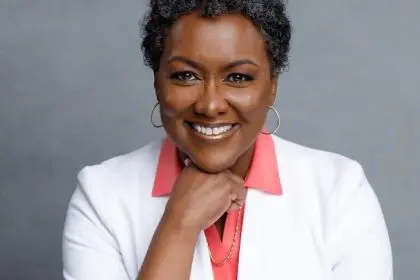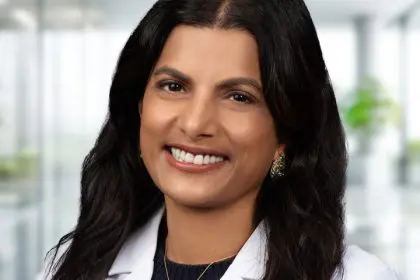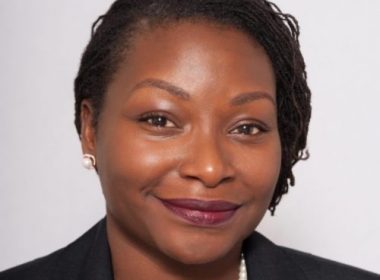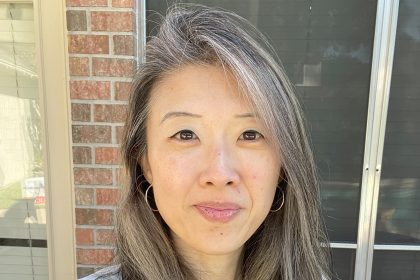Dr. Maya Green is the regional medical director for communities on Chicago’s south and west side at Howard Brown Health. A graduate of Alabama A&M University and the University of Illinois College of Medicine in Chicago’s MD/MPH program, she was the first to set up COVID-19 testing centers on Chicago’s south and west sides. She spoke with Munson Steed, the publisher at rolling out, concerning pressing medical issues for the Black community.
Here’s their conversation:
Munson Steed: You know, I want to say thank you for all you do to serve the entire black community. That is a real forefront; you choose to even as a doctor and not just treat those who have insurance and those who don’t but to be in the forefront of advocating for black health. So thank you so much for that. I know it’s not a popular thing to be a doctor, advocating for us inside a system that clearly has wanted to reject us. It’s a new year. What should we do immediately when we start to evaluate our health perspective as individuals this year?
Maya Green: Well, first, again, thanks for having me. It’s an honor to care for my community. And you know, I’ve been doing this well over almost two decades now. The No. 1 thing we have to do is part of the health IQ focus this year, which is we have to take agency; we have to take agency over our minds, our bodies, our spirits, and our whole health. That means we take responsibility for how well we’re doing. We learn our bodies and move to make decisions that serve us.
Munson Steed: When you think about the individuals, if we could start with people that really just haven’t gone in for the first evaluation, why is it important for us to go in for a health evaluation at the start of the year?
Maya Green: I like it at the start of the year. And it’s important to hit those health evaluations at the start of the year because it marks a time, right? Many of us are in the middle of making resolutions. Some of us aren’t. But it marks a time when you can say, “Hey, every start of the year, I need to see a provider I trust.” Right? Don’t just go in. We’re speaking of agency going to providers. You can trust a provider that will meet you where you are, and you design your health journey; this provider will walk your health journey with you. And so by marking that you have needed where you go in if you need to come back in six months, you know when that is. That’s June, and then just start that. And I also like the top of the year because it’s a time of reflection, right? And when we reflect on the health of African Americans, and currently, in the United States, there are things that are killing us faster than anyone else.
The No. 1 cause of death among African Americans, according to the Centers for Disease Control, is heart disease. Cancer, COVID, accidents –accidents, African Americans living in accidents, right things, a lot of times we don’t have agency over — 5. stroke, 6. Diabetes, 7. homicide, 8. respiratory chronic diseases like COPD or emphysema, 9. kidney disease, and 10. Alzheimer’s. So, a lot of times at the beginning of the year, if you mark these things, and they release all of these statistics, usually around this time, you can look and say, “Hey, what do I need to be ready for? What can I talk to my doctor about?” So that’s why I like to start every year.
Munson Steed: You’re a sister with superpowers; let’s lean into one you talked about that was in the top 10: heart disease in the Black community. But more than anything, heart disease for Black women.
Maya Green: Yep. And so, heart disease is one of the No. 1 killers for Black women, and a lot of times, people just throw that out — heart disease. Well, thank you for making this space. I want to go into a little bit about what that is, right? We know where our heart is. We know that, unlike our eyes, kidneys, and lungs, we only have one heart. The other ones, you got two of, right? For the kidneys, if one of them goes, then the other one can compensate. But our heart, there’s one of it, and its job is to pump not only blood but oxygen and other nutrients that feed the tissues in our bodies. Right? So, I like to look at heart disease as if the heart goes, then as the heart goes, so does everything else. So, if my heart is not pumping, my kidneys aren’t getting enough oxygen and nutrients, that’s kidney disease. If I don’t get enough oxygen to my brain often, that’s a stroke. If I don’t get enough oxygen to my lungs, it can cause pulmonary disease. And then something tied to heart disease that people don’t think about is how well your dental health is, right? So, if I have things that I’m eating, if I’m not taking good care of my teeth or oral health, those things can affect my heart. And once the heart goes, you know — one of your kidneys can stop or one of your eyes can stop, we don’t want that. But if one does, the body compensates. But once your heart stops, that’s called a heart attack. And that has major consequences that, unfortunately for our community, can be fatal.
Munson Steed: Let’s unpack a little bit of what you said. All of it’s happening at one time. There is a central organ that really is responsible for communicating and supplying oxygen everywhere. And if you are stressed, how does that impact women? Women clearly are the organizers and are responsible for so much. How does it affect your heart? And why?
Maya Green: Yeah, so stress releases hormones and steroids, something called cortisol, right? Cortisol actually puts you into this, and adrenaline puts you in this fight mode, this fight-or-flight mode, right? That’s good if you’re in a situation that you need to get out of quickly. But over time, there becomes this chronic fatigue, you know, that happens more to the African American community. There was a book about it called The Weathering,” but over time, there’s this chronic fatigue, and we adjust by trying to normalize the stress, but our bodies know better, right? So what that looks like long term, you have your fight-or-flights, and your body focuses less on healing and more on surviving your current situation.
So, it actually goes to oxygen, nutrients, and those things you mentioned earlier; it takes away from healing and starts putting it into surviving whatever current situation you’re in. So, let’s go to the heart and the blood vessels and what that looks like. When we’re asleep [and] when we’re resting, this is my blood vessel; they’re supposed to be like that, right? Nice and easy, when you’re getting all of the healing and, nutrients and oxygen you need to all of your organs, right? But when you’re in that fight or flight, and that cortisol is running, right, you go from nice and easy to this. Right, so all of that tension makes your blood vessels constrict. So, that means you’re getting less blood and less nutrients to your tissues. And again, this isn’t happening for two seconds. This is happening over time, right? And so what that does is it sets up a situation where you’re now, we talked about ten different things in the top 10, but this is heart disease. This is heart disease and stroke; this is the reason you’re also getting it in African Americans earlier, right? We’re more aggressive; this whole system gets more aggressive. And what that means is that you can see a heart attack, a stroke, you know, it can cause brain damage, it can cause kidney damage, and it can also just cause premature aging of your organs. So when we talk about stress, I like to bring it up because it has to be a part of our health IQ, how we’re approaching our health, because it’s definitely been a part of our health journey.
Munson Steed: You’ve shared what stress does. What can you do to break that cycle? How can you mitigate and manage and have strategies to really take the wind out of the sails of stress?
Maya Green: Yeah, and stress, you know, stress is everywhere, right? We’re talking [about how] sometimes people see the world and how it’s impacting them, but sometimes it’s what’s happening at home, right? So you can’t just leave your home. But what can you do? You can take a moment and take that time for yourself. You can have open conversations, you know? Sometimes, it’s your partner that’s putting you into a stressful situation. If you’re with a good partner, a good partner wants to know they’re not adding stress to your life. I think communication is so key, talking about what’s happening, not just what’s happening out there, but what’s happening in here.
It’s also about taking that time and finding what you enjoy, right? Going out and walking, you know, finding activities that work for you, whether it’s painting, whether it’s going to see a comedy show, like you talked about, you like to go see the comedy show, what we can also do as a part of breaking that cycle is, say you’re going to go get your blood pressure checked regularly, you know, we all got that one friend, you might be that friend, that’s like, “Oh, man, I don’t know. It just kind of feels a little high.” Don’t just say that. Go get it checked; get your numbers checked, right? Because then you can track that number. And then, if it’s high, you can come up with a plan with your provider, or if you don’t have a provider that you trust, find one. I’m here. There are many like me across the nation. You know, for us, this is something we’re really passionate about. But finding someone who you trust and creating that partnership to have a game plan if you’re noticing your numbers are high.
Munson Steed: Well, clearly, being a person that practices some level of preventive measures and investing in one’s own health, being a self-advocate for one’s own health, why is that so important to the black community?
Maya Green: Well, you know, one of the things we don’t talk about and a lot of times, we only hear about it once it’s too late is that often, we are the first line of defense. Right? The other thing we don’t hear about is in the medical field, as we look at algorithms and the basis of medicine, we always talk about when it comes to black patients, we got to bring it down a notch, you know, we got to go to the lowest common denominator when we talk about treatment options. Right? And we don’t have this conversation. But if you go into any medical school, they’re going to teach you that in terms of us, we get the worst of the worst when it comes to treatment options. So often, we need to bring that up to our providers when we go into a hospital or our doctor’s office when we go into our clinics. And so we have to advocate for ourselves; we have to say, “Hey, I heard that there are these studies. I know these are the options. I don’t want just what’s been given; I want to know what all of my options are.” We have to be advocates for ourselves. And then that also means finding a provider that you trust. I always tell people when you’re looking for a provider, go to your provider and interview your provider. I tell people when you go to your provider, you’re interviewing them. Don’t let it be a situation where you have to go see them. And they are telling you what to do. You ask them questions, and you can even start your questions with them and say, “Hey, what are your thoughts on?” Then, give them something you want to know about and let them talk. And you see if that aligns with where you want to be in your health journey.
Munson Steed: So, as we wrap up here, because your knowledge is so vast and critical, if you could share one thing about how we can have a better perspective about our own health, and not to take it for granted, in one statement, what would you say?
Maya Green: I would say that your health is your wealth. Your health is your wealth. Your health is your wealth. And that’s something we say that — it’s almost like a greeting, you know, in my family, like if you walk out the door, my mom will say, “Hey, take care of yourself. Your health is your wealth.” But it’s something that I truly, truly believe. And if we shift our mindset, and we really start to value our health as our wealth, I think we’ll make different decisions, we’ll show up differently, we’ll walk differently, we’ll talk differently, we’ll get our friends and family involved differently because your health is your wealth.
Munson Steed: Dr. Green, thank you so much for spending time with us at rolling out.
Maya Green: Thank you so much for having me. It was an honor. And I hope everybody has a wonderful, prosperous, and healthy New Year. Happy New Year.














